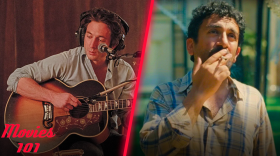DAN WEBSTER:
Imagine what it must be like to live in a country where there are limits on the free expression of art. Of course, given the way things are going in the United States these days, we may soon find out. Until then, though, we can take lessons from the career of Iranian filmmaker Jafar Panahi.
Panahi's latest film—which won the top prize, the Palme d'Or, at this year's Cannes Film Festival—is titled It Was Just an Accident. And it is an exploration of the life-changing events that affect a group of Iranian civilians while representing what writer-director Panahi himself experienced during the time he served in an Iranian prison.
His crime? Making movies that Iran's leaders didn't approve of and which they claimed violated the country's harsh laws, heavily influenced as they are by Islamic tradition. In 2010, Panahi—who had been making films since the late 1980s—was imprisoned for trying to film a documentary about the protest that occurred after the disputed 2009 Iranian presidential election.
Even though he was barred from directing movies for the next 20 years, Panahi continued to defy the authorities. Following such earlier films as The Circle, which deals with the treatment of women, and Offside, in which a group of girls defy the authorities by sneaking into a soccer stadium to watch a match, Panahi kept working, often in secret, to depict Iranian life in a way that continued to displease the government.
Among the six films that resulted in his 2011 effort This is Not a Film, which documents his living at home, working on his legal battles and describing the documentary he was not allowed to finish. In 2015, he made Taxi, which features his driving around Tehran and talking to various passengers.
And now we have It Was Just an Accident, which is among Panahi's most pointedly critical efforts to date. It's among his most artistic, as well, particularly in the way it uses a sound to connect the film's disparate parts.
the film opens at night with a family, mother and father and pre-teen daughter, driving along a dusty country road. After hitting a dog and damaging his car, the father drives to a garage and requests help. In the garage, another man, the mechanic Vahid, suddenly grows alert.
The next morning, Vahid follows the driver as he takes his car to another shop for a more complete repair. Then, when the man exits the shop, Vahid accosts him, knocking him unconscious. The next thing we see is Vahid, out in a remote spot, digging a hole into which the plans to bury the driver.
Only then do we discover why. It turns out Vahid believes the driver is a man named Eghbal, someone who was an official in the prison where Vahid was once held and tortured. Since he was blindfolded at the time, Vahid can't be sure. But his clue is that fact that the man wears a prosthetic leg (in the prison, Vahid and others called him Peg Leg), and when he walks it makes a distinctive sound. it is that sound that both alerted Vahid... and terrified him.
The driver, though, insists that Vahid has the wrong guy—that he isn't Eghbal or Peg Leg and that he never tortured anybody. he's just convincing enough that Vahid hesitates—and then decides to consult with other formerly incarcerated individuals to see if they can confirm his suspicions.
Thus begins Vahid's trek across Tehran (although some scenes reportedly were shot in France for security reasons). With his hostage locked in a box, Vahid drives his van to meet up with everyone from a female photographer named Shiva, to an engaged couple—of whom the future bride Goli was also tortured—and finally Hamid, whose prison time still haunts him.
And yet the problem remains: none of them can positively identify the driver as the man they knew as the dreaded Peg Leg—though Hamid argues that they should kill him anyway, just to be safe.
Panahi resolves the situation ambiguously, leaving his audience to opt for whatever interpretation that seems most appropriate. It's an ending, however, that serves to enhance his overall message of what terrors authoritarian regimes can, and do, perpetrate on their citizens. And, artist that he is, Panahi underscores his point with a sound that is both final... and chillingly ominous.
For Spokane Public Radio, I'm Dan Webster.
——
Movies 101 host Dan Webster is the senior film critic for Spokane Public Radio and is a blogger for spokesman.com.




